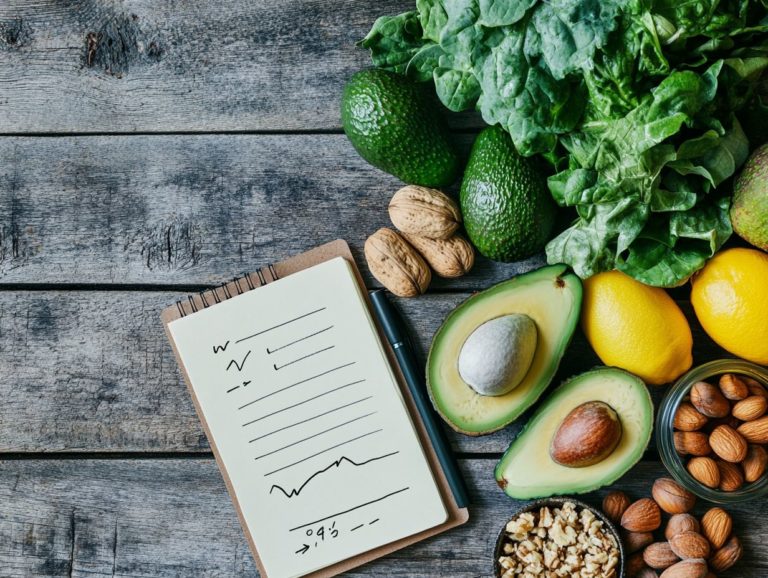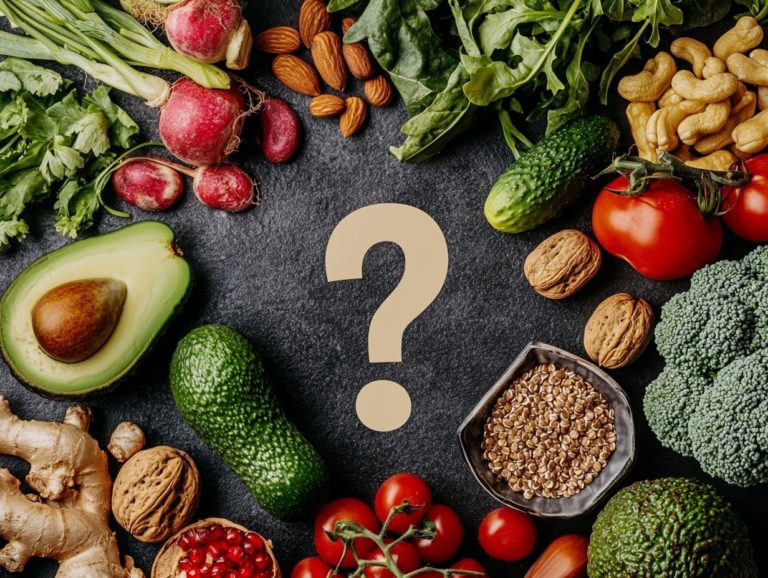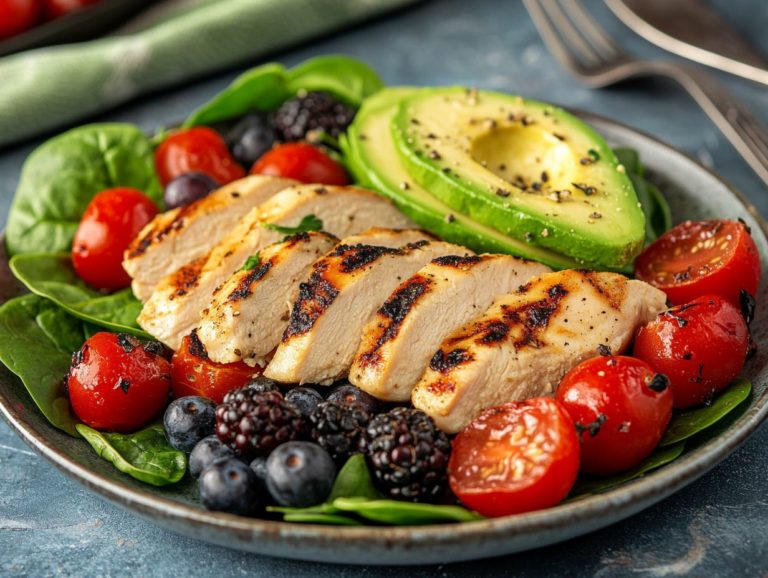How to Plan for Keto Success: Common Questions
The Keto Diet, often associated with the ketogenic diet, has become a prominent choice for those seeking a distinctive approach to weight loss and health management. By significantly cutting down on carbohydrate intake and replacing it with healthy fats, this low-carb diet encourages your body to enter a body s energy process known as ketosis. Unlock the secrets of the Keto Diet today! Let s dive in and start your journey to better health and weight loss with the Keto Diet!
Contents
- Key Takeaways:
- What is the Keto Diet?
- How Does the Keto Diet Work?
- What Foods Can You Eat on the Keto Diet?
- What Foods Should You Avoid on the Keto Diet?
- How to Plan for Keto Success
- What Are Some Common Questions about the Keto Diet?
- Can You Drink Alcohol on the Keto Diet?
- Is Exercise Necessary on the Keto Diet?
- Can You Have Cheat Days on the Keto Diet?
- Common Keto Questions
Key Takeaways:

- Understand what the Keto Diet is, how it works, and its potential health risks before starting.
- Focus on incorporating low-carb vegetables, fruits, and protein sources into your meals to maintain proper nutritional balance.
- Avoid high-carb and high-sugar foods to stay in ketosis.
What is the Keto Diet?
The keto diet, often referred to as the ketogenic diet, is a low-carb lifestyle designed to promote weight loss by drastically cutting down carbohydrate intake and replacing it with healthy fats, including saturated fat. This approach encourages your body to enter a body s energy process called ketosis. Ketosis is when your body uses fat for energy instead of carbohydrates.
Unlike traditional diets that typically focus on a balanced intake of carbs, the keto diet champions high-fat food choices. This helps to regulate insulin levels and enhance overall well-being. Long-term studies on this dietary approach are ongoing to fully understand its effects.
When executed properly, this dietary plan can unlock a range of potential health benefits. These include improved energy levels, better cholesterol profiles, and effective weight management.
How Does the Keto Diet Work?
The keto diet operates by significantly cutting back on carbohydrate intake, prompting your body to enter a body s energy process called ketosis. In this state, your body shifts gears and begins to burn fat for fuel instead of relying on carbohydrates.
As your liver converts fats into ketones, these become your brain and body’s primary energy source. This often results in heightened energy levels and improved mental clarity.
This metabolic shift positively impacts blood sugar and insulin levels. This makes it particularly advantageous for those managing diabetes, heart disease, polycystic ovary syndrome, and other chronic conditions.
Furthermore, by maintaining a balanced protein intake and prioritizing healthy fats, you can sustain your energy levels throughout the day while effectively working toward your weight loss goals.
What Foods Can You Eat on the Keto Diet?
Expert Opinions
According to the Mayo Clinic, Kendra Whitmire, Scott Keatley, and Kelly Kennedy, adhering to the keto diet involves consuming high-fat, low-carb foods.
When you embark on the keto diet, your meal planning should focus on indulging in foods rich in healthy fats and moderate in protein, while being extremely low in carbohydrates. Think avocados, nuts, seeds, olive oil, and fatty fish these are not only delicious but are also packed with omega-3s and other essential nutrients.
Don’t overlook leafy greens and non-starchy vegetables; they offer the necessary fiber while keeping your carb count low, promoting better digestion. Mastering proper cooking techniques and meal prep strategies becomes essential for your success on the keto journey.
This knowledge enables you to develop creative recipes and craft meals that are both satisfying and free from processed ingredients. All of this will keep you aligned with your weight loss goals and dietary nutrition guidelines.
What Are Some Keto-Friendly Vegetables?
Keto-friendly vegetables consist primarily of non-starchy greens, which are low in carbohydrates yet packed with essential nutrients and fiber. This makes them a cornerstone of your keto diet.
These vegetables include leafy greens like spinach, kale, and arugula, along with cruciferous options such as broccoli and cauliflower. By incorporating a variety of these vegetables into your meals, you not only adhere to dietary restrictions but also enhance your overall health, providing your body with the antioxidants and vitamins it craves.
Take spinach, for example; it’s a fantastic source of iron that can be effortlessly saut ed in olive oil for a quick side dish. You can also blend it into smoothies for an extra nutrient boost.
Broccoli and cauliflower offer incredible versatility. Roast them with healthy fats like avocado oil to elevate their flavor, or transform them into low-carb rice alternatives for a creative twist.
Keto-friendly choices help maintain a healthy mix of nutrients and ensure you re getting enough fiber, which is essential for digestion. Don t shy away from experimenting with different cooking methods; doing so keeps your meals exciting and introduces a delightful array of flavors and textures that perfectly align with keto principles.
What Are Some Keto-Friendly Fruits?

While most fruits tend to be loaded with carbohydrates, you ll be pleased to discover that there are several keto-friendly options you can enjoy in moderation without throwing your body out of ketosis. Berries like strawberries, raspberries, and blackberries are lower in sugar compared to their fruit counterparts, providing essential vitamins and antioxidants.
Avocados, often thought of as a vegetable, are actually fruits packed with healthy fats. Their versatility makes them a staple in the keto diet, promoting satiety and a healthy mix of nutrients.
These fruits not only satisfy your sweet cravings but also come with a host of health benefits, including improved heart health and anti-inflammatory properties. Incorporating these options into your daily meals can be effortless just toss a handful of berries into your low-carb yogurt or blend some avocado into a refreshing smoothie.
Ensuring a variety of keto-friendly fruits in your diet helps prevent a lack of nutrients, making healthy choices easier and more enjoyable as you navigate your ketogenic lifestyle. Proper hydration is also crucial. By being mindful of your fruit selections and serving sizes, you can savor their delightful flavors and health benefits while staying on track with your dietary goals.
What Are Some Keto-Friendly Protein Sources?
Keto-friendly protein sources are crucial for maintaining muscle mass and supporting overall health while following the ketogenic diet. High-quality options abound, including fatty cuts of meat like ribeye, pork belly, and chicken thighs.
Rich fatty fish such as salmon and sardines are packed with omega-3 fatty acids that promote heart health. By incorporating these protein sources through various cooking techniques, you can create flavorful meals that align with your low-carb approach and aid in achieving your weight loss goals.
Eggs also emerge as a versatile and nutrient-dense protein source, brimming with healthy fats and essential vitamins. Whether you prefer them boiled, scrambled, or as part of keto-friendly baking, eggs offer endless possibilities.
Plant-based options like tempeh and certain nuts can enhance your protein intake, ensuring a diverse and nutritious dietary profile while maintaining a healthy fiber intake. With these ingredients in mind, meal prep becomes not only straightforward but also enjoyable.
Incorporating these foods into your keto diet can help you indulge in rich flavors that satisfy your hunger throughout the day. Don’t miss out on the delicious benefits of these keto-friendly vegetables, fruits, and proteins!
What Foods Should You Avoid on the Keto Diet?
Avoiding certain foods is essential for successful navigation of the keto diet. Indulging in high-carb items can throw you out of ketosis, a state that helps you lose weight effectively and manage energy. Consult a doctor for guidance.
You ll want to steer clear of sugary snacks, bread, pasta, rice, and most starchy vegetables. These foods can rapidly elevate your carb intake and trigger insulin spikes. Maintaining a low carb intake is crucial for managing body weight.
It’s wise to limit processed foods due to their hidden sugars and unhealthy fats. These can contradict dieting strategies and physical activity goals. By strictly adhering to these dietary restrictions, you can unlock long-term health benefits and stay on track with your weight loss goals.
High-Carb Foods to Avoid
Foods rich in carbohydrates can pose a significant challenge to your keto diet. They make it difficult to achieve and maintain ketosis. Steer clear of common high-carb culprits like bread, pasta, rice, potatoes, and sugary cereals. These can elevate insulin levels and hinder your fat-burning abilities.
Understanding the impact of carb-heavy food choices is essential for crafting a successful ketogenic diet plan. Indulging in these types of foods can lead to considerable fluctuations in your blood sugar levels, complicating your weight loss efforts further.
Take, for instance, a morning bowl of oatmeal. While it may seem like a healthy choice, it s loaded with carbohydrates that can send your insulin soaring. Similarly, a serving of mashed potatoes could trigger unexpected cravings and increased hunger later in the day.
If you’re committed to the keto lifestyle, prioritize keto-friendly foods like leafy greens and healthy fats. These options not only help stabilize your insulin levels but also align seamlessly with your fat-loss goals.
High-Sugar Foods to Avoid
Foods that are high in sugar present a formidable challenge to your keto diet. These can swiftly elevate blood sugar levels and disrupt the ketosis state essential for effective weight loss. Avoid items like candies, sodas, baked goods, and sweetened beverages. They contribute to excessive sugar intake and often contain processed ingredients that undermine your health goals.
By avoiding these high-sugar foods, you ll stay on track faster and minimize the health risks associated with sugar consumption.
Processed foods, particularly pastries and sugary cereals, can be particularly detrimental to maintaining a low-carb lifestyle. These items are rife with hidden sugars, unhealthy fats, and additives that can compromise your overall health.
The health risks tied to high-sugar diets such as increased inflammation, weight gain, and insulin resistance underscore the importance of sticking to strict dietary guidelines. Embrace the benefits of a ketogenic diet by choosing whole, nutrient-dense foods while avoiding any tempting distractions that could derail your progress.
How to Plan for Keto Success
Planning for success on the keto diet requires strategic meal planning. Make sure you have access to keto-friendly foods while staying true to your dietary goals. Prepare meals in advance, meticulously track your carb and protein intake, and use cooking techniques that resonate with the ketogenic lifestyle.
Staying motivated is essential. Incorporating variety into your meals and experimenting with new recipes can ensure your journey remains enjoyable and aligned with your weight loss aspirations.
A solid grasp of dietary nutrition is vital for striking the right balance and sidestepping common pitfalls associated with the ketogenic approach.
What Are Some Tips for Meal Planning on the Keto Diet?

Effective meal planning on the keto diet requires a strategic approach to selecting ingredients that not only align with your dietary restrictions but also maximize flavor and satisfaction. Start by crafting a weekly meal plan that incorporates a diverse array of high-fat, low-carb foods. Consider batch-cooking meals to streamline your week and save precious time. Embrace healthy cooking methods such as grilling, roasting, or saut ing to enhance flavors without introducing unwanted carbs, making it easier for you to stick to your weight loss goals.
Incorporating fresh vegetables like spinach, zucchini, and bell peppers will not only boost the nutritional value of your meals but also keep things interesting on your plate. When preparing your shopping list, prioritize whole foods think meats, avocados, and nuts to reinforce those healthy choices.
Dedicate a day solely to meal prep; this allows you to enjoy heartier dishes throughout the week, providing the flexibility to quickly reheat meals whenever hunger strikes. Don t shy away from experimenting with various herbs and spices to elevate your cooking; this will ensure that each dish remains exciting and bursting with flavor, making your keto journey all the more enjoyable.
How Can You Stay Motivated on the Keto Diet?
Staying motivated on the keto diet can be quite the challenge, especially as you navigate dietary restrictions and those pesky cravings for high-carb foods. However, setting clear fitness goals can provide you with direction and purpose.
Keeping a meal tracking journal not only helps you visualize your progress but also keeps you accountable; it s your personal cheerleader, allowing you to celebrate your achievements along the way. Connecting with a supportive community or finding a keto buddy can foster encouragement and shared experiences, ultimately reinforcing your commitment to the diet.
It s crucial to acknowledge the role of dietary nutrition in maintaining your energy levels, as this can greatly impact your motivation. By planning meals that are rich in healthy fats and proteins, you can sidestep the fatigue that often accompanies strict dieting.
Enhancing your motivation also involves setting smaller, achievable milestones to make the journey feel less daunting. Regularly reviewing your meal tracking entries not only provides insight into your behaviors but also serves as a powerful reminder of how far you ve come.
When applied consistently, these strategies can transform your keto experience from a challenging endeavor into a fulfilling lifestyle change.
What Are Some Common Questions about the Keto Diet?
As the keto diet continues to rise in popularity, you may find yourself grappling with important questions about its safety, effectiveness, and the underlying science, especially when it comes to health risks and the notorious keto flu that often accompanies the initial phase of dietary adaptation.
Familiarizing yourself with dietary guidelines and what lies ahead can significantly alleviate concerns and create a smoother transition into this low-carb lifestyle. By addressing symptoms and optimizing your nutritional intake, staying informed about these aspects can pave the way for a more successful and enjoyable keto journey.
Can You Drink Alcohol on the Keto Diet?
You may find yourself pondering the implications of alcohol consumption while following the keto diet. Certain beverages can drastically affect your carb intake and potentially disrupt ketosis.
While you can incorporate lower-carb options like dry wines and spirits into your keto lifestyle, be vigilant about mixers and sugary cocktails. These can lead to unintentional spikes in carbohydrate consumption.
Choosing the right alcoholic beverages can make all the difference in your keto journey. For instance, opting for spirits such as vodka, gin, or whiskey and mixing them with soda water allows you to maintain ketosis while keeping your carb intake impressively low.
On the flip side, you should steer clear of high-carb beers and sweet wines, as they present risks that could derail your dietary efforts. Moderation is key; excessive alcohol consumption can lead to various health risks, including impaired judgment when it comes to food choices and possible weight gain.
By understanding how different drinks impact your overall health and committing to moderation, you can enjoy social occasions without compromising your keto lifestyle.
Is Exercise Necessary on the Keto Diet?
While exercise isn’t a strict requirement for finding success on the keto diet, incorporating physical activity into your routine can significantly enhance its benefits. Regular exercise boosts your overall health and aids in weight management.
It also increases your energy levels as you adjust to a high-fat diet. Finding the right balance between your nutritional choices and physical activity can lead to optimal results on your keto journey.
Engaging in various forms of physical activity whether it s strength training, cardiovascular workouts, or even something as simple as taking a walk actively supports your metabolic processes and enhances fat oxidation.
By elevating your heart rate and building muscle, you can burn calories more efficiently and improve your body composition. Exercise also helps reduce some potential side effects of the keto diet, like fatigue and lethargy, smoothing your transition into this new lifestyle.
Thus, adopting a well-rounded approach that combines a ketogenic eating plan with regular exercise is essential for promoting long-term health and achieving your specific fitness goals.
Can You Have Cheat Days on the Keto Diet?
Curious about cheat days? They can be a double-edged sword in your keto journey! The idea of having cheat days on the keto diet can spark quite a debate, as indulging in high-carb foods might throw you out of ketosis and derail your weight loss efforts.
While some may argue that occasional treats can keep you motivated and satisfied, it s essential to weigh the health risks and consider how these choices align with your dietary restrictions. Understanding the implications of cheat days is crucial for maintaining progress on your keto journey.
For those committed to achieving specific weight loss or health goals, the decision to incorporate cheat days can significantly impact your overall success. Allowing yourself a cheat day can offer a psychological reprieve, helping to prevent the feelings of deprivation that often lead to binge eating.
However, deviating from strict carbohydrate limits can reignite cravings or hinder your progress, especially if you re sensitive to dietary changes. Therefore, a thoughtful evaluation of your personal objectives is vital to determine whether a cheat day will act as a helpful tool or a major setback in your keto lifestyle.
Stay committed, and you can enjoy social events without straying from your keto goals!
How Long Does it Take to See Results on the Keto Diet?

The timeline for seeing results on the keto diet can vary for you, influenced by factors such as how closely you adhere to dietary guidelines, your starting body weight, and your overall health.
Many individuals notice some initial weight loss within the first week, primarily due to a reduction in water weight and the depletion of glycogen stores. It’s important to think about nutritional ketosis, which is when your body burns fat for energy instead of carbohydrates, and protein intake in your keto journey.
However, sustainable fat loss typically unfolds over several weeks as your body adjusts to ketosis. Recognizing this process is crucial for managing your expectations and maintaining your commitment to the health benefits of the ketogenic lifestyle, including improved cholesterol levels and heart health.
In the short term, you may notice not only a drop in pounds but also shifts in energy levels, mental clarity, and cravings as your body transitions into ketosis. Achieving long-term results requires a deeper commitment, as your body learns to burn fat for fuel.
This adaptation can lead to more significant weight loss and additional health advantages, such as improved blood sugar control, reduced inflammation, and better management of chronic diseases like diabetes and heart disease.
For those who remain steadfast on this journey, the benefits can foster a sustained sense of well-being, making every step of the process just as rewarding as the ultimate destination. Consulting with a medical professional can also help address any health risks and ensure you meet your weight loss goals.
What Are Some Potential Side Effects of the Ketogenic Diet?
As someone embarking on the keto diet, you might encounter some potential side effects, especially during the initial adaptation phase often referred to as the ‘keto flu.’
This phase can bring a range of symptoms, including fatigue, headaches, and irritability, all stemming from a significant reduction in carbohydrate intake. Without careful planning, the ketogenic diet could also lead to nutrient deficiencies over time, as certain food groups are eliminated.
Consulting with a medical professional can help manage carb intake and monitor any health risks. Understanding these side effects is essential for managing your expectations and ensuring a smooth transition to a low-carb lifestyle while minimizing health risks.
To combat the keto flu, don’t wait until symptoms worsen; stay hydrated to feel better quickly. Replenishing electrolytes through foods like avocados, leafy greens, and nuts can significantly ease some of those uncomfortable symptoms.
Incorporating a variety of low-carb vegetables and high-quality protein sources into your meal plan will help counteract any nutrient deficiencies that might arise from limiting carbohydrates.
Consider supplementation to help maintain optimal health, ensuring you have essential vitamins and minerals from outside sources throughout your keto journey.
By proactively addressing these common concerns, you can pursue a ketogenic lifestyle with greater comfort and effectiveness, prioritizing meal planning and healthy fats throughout your journey.
Frequently Asked Questions
What is the keto diet and why is it important to plan for success?
The keto diet is a high-fat, low-carb diet that has been shown to be effective for weight loss and improving overall health, including managing cholesterol levels. Planning for success is crucial because it helps you stay on track and achieve your goals.
How do I start planning for keto success?
The first step is to educate yourself on the basics of the keto diet and understand which foods are allowed and which ones to avoid. Resources like the Mayo Clinic can provide comprehensive guides.
Then, create a meal plan and stock up on keto-friendly foods to make sticking to the diet easier, incorporating various cooking techniques to maintain nutritional balance.
Start your keto journey today and consult a professional for personalized guidance!
Common Keto Questions
What are some common mistakes people make when planning for keto success?
One common mistake is not getting enough healthy fats in their diet, such as those found in fruit intake like avocados.
Another mistake is not tracking macros. This can lead to consuming too many carbs. It’s also important to plan for social situations and have keto-friendly options available. This ensures you avoid processed foods.
How can I stay motivated and stick to my keto plan?
Setting realistic goals and tracking your progress is key. Joining a supportive community or finding an accountability partner can also keep you motivated.
Planning ahead and having a variety of tasty keto meals makes sticking to the diet easier, along with keeping track of what you eat.
What are some tips for dining out while on the keto diet?
Dining out on keto can be a breeze! With a bit of planning, you can enjoy delicious meals without derailing your diet.
Check the menu ahead of time and plan what you will order. Opt for grilled or roasted meats, salads with full-fat dressing, and non-starchy vegetables. Request no bread or other high-carb sides. You can also ask for keto-friendly substitutions, such as zucchini noodles instead of pasta. Engaging in proper meal prep can help you stay on track.
Is it necessary to track my macros and calories while on the keto diet?
Tracking your macros and calories can help you stay on track and ensure you are in a state of ketosis. It can also help you identify areas where you may need to make adjustments for better results.
However, it is not necessary for everyone. If you prefer a more intuitive approach, you can still be successful on the keto diet by focusing on eating whole, unprocessed foods, and maintaining a proper fiber intake.






